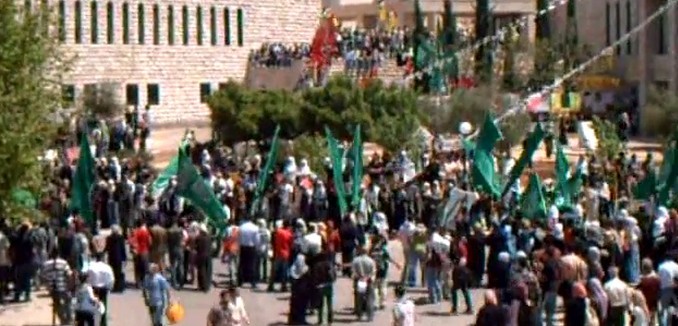The terrorist organization Hamas won the student elections in Birzeit University in the West Bank on Wednesday, defeating Fatah, the main constituent party of the Palestinian Authority which rules the West Bank. In an analysis published Thursday, Grant Rumley of the Foundation for Defense of Democracies explained that though Fatah won other student elections, some Palestinian will see the Birzeit results as a “broader referendum on Hamas’s popularity in the Fatah-controlled West Bank.”
Student groups have historically served as a springboard to positions of leadership in the Palestinian national movement. Indeed, to rise among the ranks in a Palestinian political party typically requires years of service rallying support on campuses across the West Bank and Gaza. The fact that Fatah – which dominates the Palestinian Authority in the West Bank – just lost an election to its arch-rival at a campus mere miles from Ramallah could be significant.
The fact that student elections now serve as a major event in the Palestinian political arena underscores how fractured the political system remains. The framework for the Fatah-Hamas reconciliation of 2014 included the formation of a unity government and a proposal for a new round of presidential and parliamentary elections. Since last summer’s war between Israel and Hamas, however, both Palestinian factions shifted their focus to reconstructing Gaza. But that reconstruction has stalled, with neither side willing to move past the blame game in order to prepare for elections. And now, with this week’s Hamas victory at one of the West Bank’s leading institutions, Fatah is not likely to rush to the polls.
Hamas, according to Rumley, has already proclaimed the victory as a “message” to Fatah and “will undoubtedly be viewed as a sign of further weakness.”
A year ago, Fatah and Hamas announced a unity government, effectively ending the American-sponsored negotiations between Israel and the PA. The actual implementation of the agreement has been marked by a power struggle at the expense of improving the lives of the Palestinians. According to a poll released in March, a higher percentage of Gaza residents than West Bank residents blamed Hamas for the lack of an effective Palestinian government.
Hamas’ ambitions for the West Bank was explored by Neri Zilber in What Will Happen If the Palestinians Really End Security Cooperation?, which was published in the April 2015 issue of The Tower Magazine.
These shared interests and security hazards entail many things, but none are as important as the threat of a Hamas takeover of the West Bank. “Just as we liberated Gaza…just as we established a victorious army in it,” Hamas founder Mahmoud al-Zahar declared in December, “we will make the same effort in the West Bank as we prepare to extend our presence to all of Palestine,” i.e., to the entirety of pre-1967 Israel. Prime Minister Benjamin Netanyahu warned of precisely this when he publicly blasted the PA’s recent moves at the United Nations, saying, “Abbas thinks that by taking unilateral steps he threatens us; he doesn’t understand that their result will be Hamas taking over the West Bank.”
After an extensive Hamas terror network in the West Bank was uncovered by Israeli intelligence last August, press reports suggested that nearly one hundred operatives were preparing a “coup” against the PA. It’s telling that Abbas himself heavily endorsed the notion of Hamas nefariousness, reportedly accusing the militant group of plotting to target him directly.
The struggle against Hamas in the West Bank is a model of security coordination between Israel and the PA. For example, PA intelligence provided crucial information to Israel during the manhunt for the Hamas cell that abducted and murdered three Israeli teenagers last summer. PA security forces also arrest suspected militants themselves (and have done so with increasing vigor over the last six months), or stand down when Israeli forces raid Palestinian population centers during their own operations.
It’s not a surprise, then, that Hamas has singled out this policy for particular excoriation. When Abbas called security coordination with Israel “holy” during a conference last June in Saudi Arabia, one Hamas spokesman responded by stating, “Aiding the occupation and coordinating security with it in chasing down the resistance is a crime that is punishable by law.” More recently, after the death of Ziad Abu Ein, a PA minister, during clashes with Israeli forces in December, another Hamas official called continued security coordination a “betrayal of the blood of the [Palestinian] martyrs.”
[Photo: jeefnassar / YouTube ]




